

A study on human behavior has identified four basic personality types. Understanding the Five-Factor Model and Five-Factor Theory through a South African cultural lens. Five-Factor Model of Personality - Psychology. Bigfive_John.pdf. Coalition for an Ethical Psychology.
Writing Quality. Basics of Science. Personality Defined. Personality Tests. Personality Predicted. Personality Videos. Psychoanalysis. Behaviorism. Social, Cognitive & Biological. Self Identity Memory. Note: An edited version of this chapter appeared in M.R.
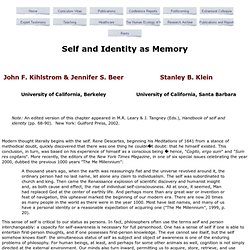
Leary & J. Tangney (Eds.), Handbook of self and identity (pp. 68-90). New York: Guilford Press, 2002. Modern thought literally begins with the self. Rene Descartes, beginning his Meditations of 1641 from a stance of methodical doubt, quickly discovered that there was one thing he couldnt doubt: that he himself existed. A thousand years ago, when the earth was reassuringly flat and the universe revolved around it, the ordinary person had no last name, let alone any claim to individualism. This sense of self is critical to our status as persons. This puzzling problem arises when we ask, "Who is the I that knows the bodily me, who has an image of myself and a sense of identity over time, who knows that I have propriate strivings?
" What Kind of Knowledge is Self-Knowledge? The Self as Concept The Self as Image. Resume of Jonathan Vos Post. Hotlinked Software version of resume * INTERNET and high-tech product development and technical marketing * COMPUTER software and systems for 30 years in over 30 languages * PROVEN track record of increased productivity at lower cost * MANAGEMENT expertise in Aerospace, Computers, Research, Marketing * DEGREED from Caltech, U.Mass.
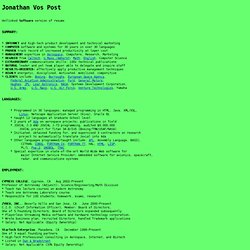
The Emperor Has No Clothes: A Review of the ‘Pornography Addiction’ Model - Online First. The addiction model is rarely used to describe high-frequency use of visual sexual stimuli (VSS) in research, yet common in media and clinical practice.
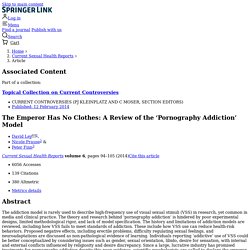
The theory and research behind ‘pornography addiction’ is hindered by poor experimental designs, limited methodological rigor, and lack of model specification. The history and limitations of addiction models are reviewed, including how VSS fails to meet standards of addiction. These include how VSS use can reduce health-risk behaviors.
Joshua D. Foster. Twins. The Personality Laboratory at UNH. Non-Discrimination and Anti-Harassment Policy and Complaint Procedures for Employees. New York University (“NYU” or the “University”) is committed to maintaining an environment that encourages and fosters appropriate conduct among all persons and respect for individual values.

Accordingly, the University is committed to enforcing this Non-Discrimination and Anti-Harassment Policy and Complaint Procedures at all levels in order to create an environment free from discrimination, harassment, retaliation and/or sexual assault. The Stanford Prison Experiment: Still powerful after all these years (1/97) CONTACT: Stanford University News Service (415) 723-2558 The Stanford Prison Experiment: Still powerful after all these years I was sick to my stomach.
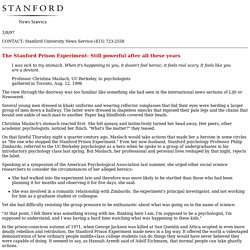
When it's happening to you, it doesn't feel heroic; it feels real scary. It feels like you are a deviant. Professor Christina Maslach, UC-Berkeley, to psychologists gathered in Toronto, Aug. 12, 1996 The view through the doorway was too familiar like something she had seen in the international news sections of Life or Newsweek. Several young men dressed in khaki uniforms and wearing reflector sunglasses that hid their eyes were herding a larger group of men down a hallway.
Basics of Buddhism. The Four Noble Truths The Four Noble Truths comprise the essence of Buddha's teachings, though they leave much left unexplained.
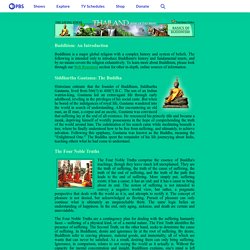
They are the truth of suffering, the truth of the cause of suffering, the truth of the end of suffering, and the truth of the path that leads to the end of suffering. More simply put, suffering exists; it has a cause; it has an end; and it has a cause to bring about its end. The notion of suffering is not intended to convey a negative world view, but rather, a pragmatic perspective that deals with the world as it is, and attempts to rectify it. The concept of pleasure is not denied, but acknowledged as fleeting. The Stanford Prison Experiment: A Simulation Study of the Psychology of Imprisonment. Thirty Years Later, Stanford Prison Experiment Lives On By Meredith Alexander Stanford Report, August 22, 2001 Thirty years ago, a group of young men were rounded up by Palo Alto police and dropped off at a new jail -- in the Stanford Psychology Department.
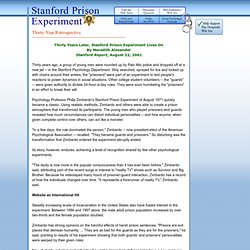
Strip searched, sprayed for lice and locked up with chains around their ankles, the "prisoners" were part of an experiment to test people's reactions to power dynamics in social situations. Other college student volunteers -- the "guards" -- were given authority to dictate 24-hour-a-day rules. They were soon humiliating the "prisoners" in an effort to break their will. Psychology Professor Philip Zimbardo's Stanford Prison Experiment of August 1971 quickly became a classic.
"In a few days, the role dominated the person," Zimbardo -- now president-elect of the American Psychological Association -- recalled. Its story, however, endures, achieving a level of recognition shared by few other psychological experiments.
OWL: Designing Effective PowerPoint Presentations. Personalities.